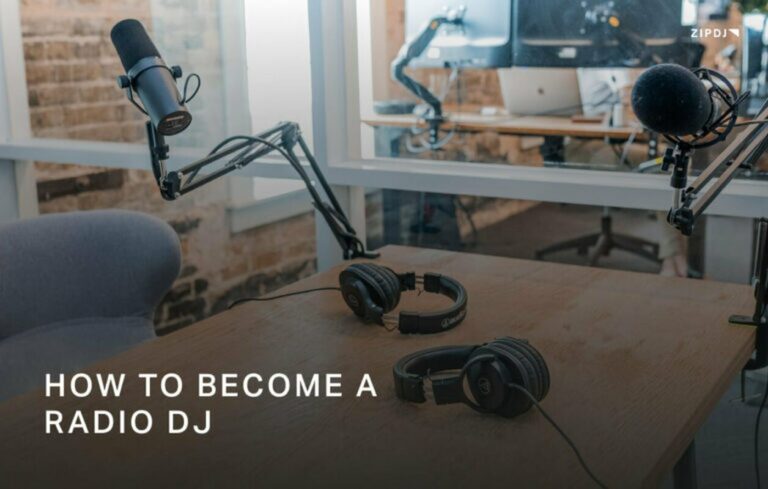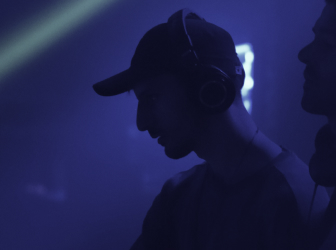How To Become A Radio DJ In 2025 (Step-By-Step)

Radio DJs cover all styles and genres and interview artists and music producers while staying on top of current events.
It’s an exciting career path that gives you access to all the music from the latest pop culture, making it a highly sought-after and well-paid career.
Read on, and we’ll break down everything you need to know about how to become a radio DJ so you can begin an exciting new profession.

How To Become A Radio DJ In 2025 (Step-By-Step)
We’ve covered all aspects of becoming a radio DJ, from gaining experience and qualifications to showing off your talents with a reel or online radio show.
If you want this guide’s short and sweet version, head down to the FAQ section at the bottom of the page for a concise overview of the basics.
With that said, here’s our comprehensive step-by-step guide on how to become a radio DJ:
Step 1: Gain The Right Qualifications
Before you consider applying for a job as a DJ at your local radio station, you might want to invest time and effort into gaining the right qualifications.
While not all commercial radio stations require a formal education, a bachelor’s degree in communications or broadcast journalism will give you a clear advantage.
There are also shorter courses covering the skillset required to work as a radio DJ, helping with media research, news reporting, and speech.
You’ll also gain valuable insights into how the software editing programs used by radio stations work and the guidelines laid out by the Federal Communications Commission (FCC).
Research the radio stations you’re interested in applying for to find out what if any, qualifications they expect from applicants.
Step 2: Apply For An Internship
An internship is another great way to get your foot in the door, with most commercial radio stations offering programs for college graduates and other candidates.
Direct experience can be more valuable than qualifications, giving aspiring radio DJs important insights into the inner workings of a radio station.
This doesn’t have to be for a mainstream commercial radio station; internships can be found working with satellite and internet DJs using similar broadcasting equipment.
It’s a great way to network and build a list of contacts if you’re a student and your college or university can help facilitate an internship with stations in your area.
Step 3: Build A Library Of Licensed Music
The best way to show off your skills as a radio host is to compile examples of your tone and style, but to do this, you’ll need an archive of fully licensed music.
One of the most popular resources for building a solid library of the latest releases is to sign up for a DJ pool, which gives you instant access to thousands of tracks.
Record pools cater to all music tastes, allowing you to easily put together music playlists without worrying about violating copyright.
They also include extensive options for searching and cataloging your library, making finding and playing music your listeners will love much easier.
Step 4: Set Up Your Own Online Radio Show
In addition to traditional commercial radio stations, thousands of internet radio stations broadcast music around the clock.
Setting up your own online radio show or podcast is an effective way to showcase your radio personality without the need for a large budget.
You can fine-tune and improve your DJ skills by putting out regular content while cultivating an audience of like-minded fans.
Live-streaming on YouTube, DJing on Twitch, or uploading shows to SoundCloud or MicCloud, are other options for putting your content online to gather feedback.
Step 5: Craft Your On-Air Personality
Crafting a distinct and exciting on-air personality bears many similarities to building a DJ brand, from choosing your genres and style to developing a social media presence.
While a traditional club DJ requires some interpersonal skills if they are inclined to interact with the crowd, a radio show host is expected to be much more communicative.
This means working on your public speaking skills and learning to develop a relationship with guests and the audience quickly.
If this isn’t something you’re used to, you can consider starting by interviewing friends and family members who are musicians and artists.
The more you practice conducting interviews, the more professional and assured your speaking voice will come to resemble professional radio DJs.

Step 6: Listen To Other Radio Shows
Whether you’re hoping to work at an independent radio station or approach one of the many satellite radio stations, researching the competition is a must.
The research will give you insights into the type of music trending in the radio industry and how the hottest on-air personalities present themselves.
It will also reveal how radio shows handle weather reports, news, and current events, establishing the kind of tone expected from radio hosts.
While there are many types of radio disc jockeys, this research will reveal the rules of thumb you can take on board before applying for your first job.
Step 7: Use Social Media platforms To Gather Feedback
If you’ve launched your own podcast or online radio station to showcase your talents, you’ll need to reach out to develop a base of listeners.
This means using social media platforms to promote your music and gather feedback on your shows so that you can make further improvements.
Set up a social media page dedicated to your radio show on Facebook and Twitter, so you can use this to build up and engage with your list of followers.
You can use these platforms to inform your fans of upcoming shows in advance and even run contests and other marketing initiatives to gain more traction.
Step 8: Collaborate On Podcasts
Building up a following as a radio host is much easier when you collaborate with other artists and creatives to create original content.
This means contacting singers, musicians, or other creative individuals and inviting them to your podcasts for in-depth conversations.
You can sweeten the deal by giving them a chance to use the podcast to promote their upcoming events and share their contact information.
While most amateur radio DJs won’t have contacts in the music industry, plenty of local bands and artists will jump at the opportunity for fresh exposure.
Step 9: Work With A College Radio Station
If you’re a student at university, you can reach out to the campus radio station and see if they’re looking for new radio DJs to host their shows.
Most universities have an on-site radio station for their broadcast journalism and communications degree programs and are happy to help get students involved.
Working with a college radio station is similar to working as a commercial radio station intern and will be viewed positively when you apply for that dream job.
If your college doesn’t have a campus station, networking with other students can open up different avenues to explore, such as getting involved with an internet radio station.
Step 10: Send A Reel To Your Local Radio Stations
Putting together examples of your mixing skills is crucial to marketing your DJ business, and including a reel allows you to show off your talent when approaching a station.
A reel is typically submitted to a music station along with the applicant’s resume, showcasing your best work, your music choice, and your effectiveness at talking on air.
If you’ve spent the time putting out regular podcasts or online radio show broadcasts, compile highlights that bring out the best of your abilities.
Unless you’re confident that an unedited show is a good representation of your style, use sound bites hand-picked from your body of work.
Once you’re happy with your reel and it reflects the full range of your disc jockey skills, put together a shortlist of your preferred radio stations and send it to them with your resume.
FAQs About Radio DJs
We’ve covered all the core considerations for anyone looking to become a radio DJ, from the importance of practicing to resources you can use to improve.
If you’re short on time and want the abridged version of this article, the answers to these frequently asked questions should get you up to speed.
Q1: What Is A Radio DJ?
A radio DJ works in an on-air position at a radio station, playing music, delivering current news, and interviewing guests.
They typically work in a specific time slot, for example, the morning drive time slot, early afternoon, or overnight shift, producing content for these audiences.
Q2: What Does A Radio DJ Do?
A radio DJ can perform various duties during their show, playing music and interviewing artists about their latest releases.
They also cover the latest news and current affairs and handle phone calls from listeners to answer their questions on various topics.
Radio DJs often report on special events in the local area, keeping their listeners informed about upcoming shows that might be of interest.
Q3: What Skills Are Needed To Be A Radio DJ?
Radio DJs bring a range of skills to their role that helps them to think on their feet and maintain a lively presence and engaging content.
They possess great organizational skills that allow them to plan and execute their shows, keeping their content up to date at all times.
DJs also bring a positive attitude and sense of humor to their shows to ensure the content is upbeat while remaining calm in the face of unexpected challenges.
This means having the capability to leave your bad mood at the door, allowing you to maintain a positive vibe regardless of your personal life.
Q4: How Much Do Radio DJs Make?
The basic salary of a radio DJ varies from one outlet to the next, with lower earnings when working with a small station compared to larger nationwide outlets.
The average salary of a radio DJ in America at the time of writing is around $40,000, with the salary range falling between $33,000 and $49,000.
It’s also possible to make money as an independent radio DJ, monetizing your show through on-air commercials and other advertising revenue.
Q5: What Makes A Good Radio DJ?
Becoming a radio DJ isn’t a job for a boring person; indeed, radio DJs are expected to be outspoken and charismatic with a gift for talking.
They should be skilled at reflecting their taste in music while keeping their audience engaged with their voice and communication ability.
A good radio DJ is also acutely aware of their specific audience and can address listeners as individuals to understand their particular needs.
Radio DJs are also expected to be social media savvy, using these platforms to encourage listeners to participate and engage with their shows.
Summary
We hope you’ve found this guide to becoming a radio helpful and are ready to apply for a position at your local radio station.
While there’s plenty of competition for radio show hosts, persevere and hone your presentation skills, and an opportunity will arise.
With enough practice, you’ll soon be hosting in front of a live audience and working your way up to landing the best time slots.
Access an extensive music library when you sign up for the ZIPJ pool and use them for your online radio show or reel.
Not a member ?
Join Today for Unlimited Music Downloads. Visit zipdj.com for more information.



